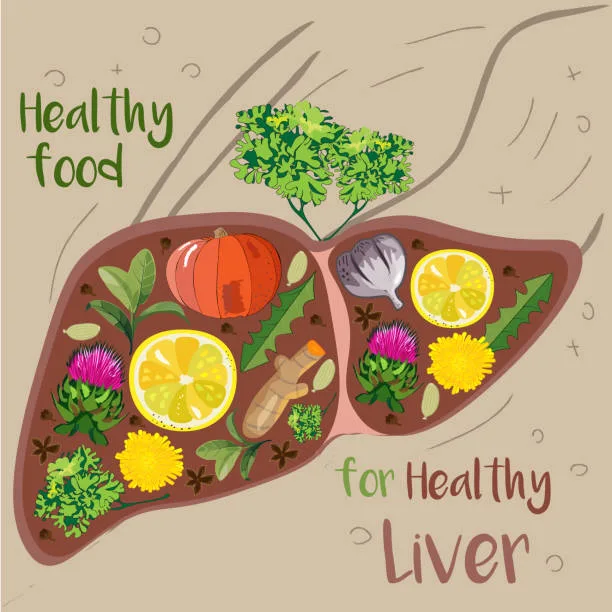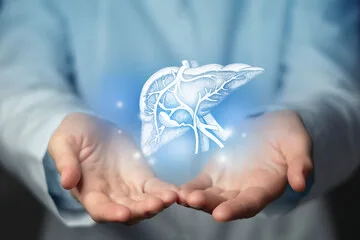
How to Keep Your Liver Healthy: Understanding Warning Signs of Liver Dysfunction
The liver is a fundamental organ that assumes an urgent part in keeping up with by and large well-being and prosperity. It performs various functions, such as detoxifying harmful substances, producing bile for digestion, storing, and releasing glucose, and storing vitamins and minerals.
However, like any other organ, the liver can also be susceptible to various health issues, and it is important to recognize warning signs of liver dysfunction to take timely action. In this article, we will discuss the key indicators that your liver may be unhealthy and provide practical tips to maintain optimal liver health.
Understanding the Warning Signs
The liver may show several warning signs when it is not functioning optimally. These signs can include:
Fatigue and Weakness: If you are experiencing persistent fatigue and weakness, it could be an indication of liver dysfunction. The liver is responsible for converting food into energy, and when it is not functioning properly, it can lead to decreased energy levels and overall weakness.
Jaundice: Jaundice is a condition portrayed by the yellowing of the skin and eyes. It occurs when the liver is unable to process bilirubin, a waste product that is normally excreted through bile. When bilirubin accumulates in the blood, it can lead to jaundice, which can be a warning sign of liver dysfunction.
Digestive Issues: The liver produces bile, which helps in the digestion of fats. When the liver is not functioning optimally, it can lead to digestive issues such as bloating, constipation, and diarrhea.
Abdominal Pain and Swelling: Liver dysfunction can also manifest as abdominal pain and swelling. This can occur due to inflammation of the liver or the accumulation of fluid in the abdominal cavity, a condition known as ascites.
Changes in Urine and Stool: Dark-colored urine and pale-colored stools can also be warning signs of liver dysfunction. The liver is responsible for processing waste products, and changes in urine and stool color can indicate impaired liver function.
Skin Rashes and Itching: The liver plays a role in filtering toxins from the body. When the liver is not functioning properly, toxins can accumulate in the blood, leading to skin rashes and itching.
If you are experiencing any of these warning signs, it is important to consult a healthcare professional for a proper diagnosis and appropriate treatment.

Tips for Maintaining Optimal Liver Health
Taking proactive steps to maintain optimal liver health is crucial to prevent liver dysfunction. Here are some practical tips that can help you keep your liver healthy:
Maintain a Healthy Diet: A balanced diet that is rich in fruits, vegetables, whole grains, lean proteins, and healthy fats is essential for optimal liver health. Avoid or limit the consumption of processed foods, sugary beverages, and excessive alcohol, as they can contribute to liver damage.
Stay Hydrated: Drinking an adequate amount of water can help flush out toxins from the liver and promote optimal liver function. Attempt to drink somewhere around 8-10 glasses of water each day.
Exercise regularly: Regular physical activity helps maintain a healthy weight, reduces the risk of fatty liver disease, and promotes overall liver health.
Pull out all the stops for 30 minutes of moderate-power exercise, such as lively walking or swimming, on most days of the week.
Limit Alcohol Consumption: Excessive alcohol consumption can cause liver damage and increase the risk of liver diseases such as cirrhosis. It is important to limit alcohol intake or avoid it altogether to maintain optimal liver health.
Avoid Smoking and Drug Abuse: Smoking and drug abuse, including the misuse of prescription and over-the-counter medications.
Get Vaccinated: Vaccination against hepatitis A and B can help prevent viral hepatitis, which is a leading cause of liver dysfunction. Consult with your healthcare provider to determine if you need to get vaccinated.
Practice Safe Sex: Practicing safe sex can reduce the risk of sexually transmitted infections, including hepatitis B and C, which can cause liver damage. Continuously use condoms and get tried routinely for physically communicated diseases.
Manage Chronic Conditions: Chronic conditions such as diabetes, obesity, and high cholesterol can increase the risk of liver dysfunction. Work with your healthcare provider to effectively manage these conditions through proper medication, diet, and lifestyle changes.
Avoid Excessive Use of Medications and Herbal Supplements: Excessive use of medications, including over-the-counter drugs and herbal supplements, can cause liver damage. Always follow the recommended dosage and consult with your healthcare provider before taking any new medication or herbal supplement, especially if you have a history of liver disease.
Practice Good Hygiene: Maintaining good hygiene practices, such as washing your hands regularly and avoiding sharing personal items such as razors or toothbrushes, can reduce the risk of viral hepatitis infections, which can affect liver health.
Get Regular Check-ups: Regular check-ups with your healthcare provider can help monitor your liver health and detect any potential issues early on. It is important to follow recommended screening guidelines for liver diseases, especially if you have risk factors such as a family history of liver disease or a history of excessive alcohol consumption.

Reduce Exposure to Environmental Toxins: Exposure to environmental toxins such as pesticides, chemicals, and pollutants can contribute to liver dysfunction.
Take necessary precautions to reduce your exposure to such toxins, such as using protective equipment and following safety guidelines when handling chemicals or working in environments with potential toxins.
Remember, maintaining optimal liver health requires a holistic approach that includes a healthy diet, regular exercise, responsible alcohol consumption, and avoiding risky behaviors. By following these tips, you can take proactive steps to keep your liver healthy and prevent liver dysfunction.
Herbal Remedies for Liver Health
In addition to lifestyle changes, there are several herbal remedies that have been traditionally used to support liver health. While scientific evidence for their effectiveness is limited, some herbs have shown the potential in promoting liver health.
It’s important to note that herbal remedies should always be used with caution, and it’s recommended to consult with a healthcare professional before starting any herbal treatment especially if you have liver disease or are taking medication, here are some commonly used herbs for liver health:
Milk Thistle (Silybum marianum): Milk thistle is a popular herb known for its liver-protective properties. It contains an active compound called silymarin, which has antioxidant and anti-inflammatory properties that may help protect liver cells from damage and promote liver detoxification. Milk thorn is accessible in different structures, including containers, concentrates, and teas.
Turmeric (Curcuma longa): Turmeric is a spice known for its anti-inflammatory properties and is commonly used in traditional medicine for liver health.
It contains an active compound called curcumin, which has been shown to have antioxidant and anti-inflammatory effects that may help protect the liver from damage and promote liver regeneration. Turmeric can be consumed as a spice in cooking or taken as a supplement in capsule or extract form.
Dandelion (Taraxacum officinale): Dandelion roots and leaves have been traditionally used for liver health. Dandelion has diuretic properties, which may help promote liver detoxification by increasing urine production and flushing out toxins from the body. Dandelion is available in various forms, including teas, capsules, and extracts.
Artichoke (Cynara scolymus): Artichoke is a vegetable that has been traditionally used for liver health. It contains compounds like cynarine and silymarin, which have antioxidant and liver-protective properties. Artichoke has been shown to promote bile production, which helps with digestion and liver detoxification. Artichoke can be consumed as a vegetable or taken as a supplement in capsule or extract form.
Licorice (Glycyrrhiza glabra): Licorice root has been traditionally used for liver health due to its antioxidant and anti-inflammatory properties. It contains an active compound called glycyrrhizin, which has been shown to have hepatoprotective effects, meaning it may help protect the liver from damage.
However, licorice should be used with caution as it can interact with certain medications and may not be safe for everyone. It’s important to consult with a healthcare professional before using licorice root as a liver remedy.
Ginger (Zingiber officinale): Ginger is a common spice known for its anti-inflammatory properties and has been used in traditional medicine for liver health. Ginger has been shown to have antioxidant effects and may help protect the liver from damage caused by oxidative stress. Ginger can be consumed as a spice in cooking or taken as a supplement in capsule or extract form.
Schisandra (Schisandra chinensis): Schisandra is an herb used in traditional Chinese medicine for liver health. It has adaptogenic properties, which means it helps the body adapt to stress and may help protect the liver from damage caused by stress.
Schisandra has also been shown to have antioxidant and anti-inflammatory effects that may benefit liver health. Schisandra is available in various forms, including teas, capsules, and extracts.
It’s important to note that while herbal remedies may have potential benefits for liver health, they are not a substitute for medical treatment. If you suspect you have liver dysfunction or any other health concerns, it’s crucial to consult with a healthcare professional for proper diagnosis and treatment.

Medical Treatments for Liver Dysfunction
When it comes to liver dysfunction, there are various medical treatments that may be recommended by healthcare professionals based on the underlying cause and severity of the condition. Here are some commonly used medical treatments for liver dysfunction:
Medications: Depending on the specific liver condition, medications may be prescribed to manage symptoms, slow down disease progression, or treat underlying infections. For example, antiviral medications may be used to treat viral hepatitis, while immunosuppressant drugs may be prescribed for autoimmune liver diseases.
Lifestyle modifications: Lifestyle changes may be recommended to manage liver dysfunction. This can include avoiding alcohol, following a healthy diet, getting regular exercise, and maintaining a healthy weight. Lifestyle modifications can help improve liver function and prevent further damage.
Liver transplant: In cases of severe liver dysfunction or liver failure, a liver transplant may be considered a last resort. In a liver transplant, a damaged liver is replaced with a healthy liver from a donor. However, a liver transplant is a complex procedure and not suitable for everyone, as it requires careful evaluation and selection of candidates.
Symptom management: Medications may be prescribed to manage symptoms such as jaundice, fatigue, and itching associated with liver dysfunction. These medications may help relieve discomfort and improve quality of life.
Nutritional support: Nutritional support may be recommended to ensure that the liver receives adequate nutrients for proper functioning. This can include dietary changes, vitamin and mineral supplements, and specialized nutrition plans tailored to individual needs.
Close monitoring: Regular monitoring of liver function through blood tests and imaging studies may be necessary to assess the progress of liver dysfunction and adjust treatment plans accordingly.
It’s important to note that medical treatments for liver dysfunction should be prescribed and monitored by qualified healthcare professionals. It’s crucial to follow their recommendations and treatment plan for optimal management of liver dysfunction.
End
All in all, the liver is an essential organ that assumes an urgent part in keeping up with general well-being and prosperity. Recognizing warning signs of liver dysfunction, such as fatigue, jaundice, digestive issues, abdominal pain, changes in urine and stool, and skin rashes, is essential in taking timely action.
Additionally, adopting healthy lifestyle habits, such as maintaining a balanced diet, staying hydrated, exercising regularly, limiting alcohol consumption, avoiding smoking and drug abuse, getting vaccinated, managing chronic conditions, practicing good hygiene, getting regular check-ups, and reducing exposure to environmental toxins, can significantly contribute to maintaining optimal liver health.
Keep in mind, counteraction is key regarding liver well-being. By incorporating these tips into your lifestyle, you can take proactive steps to keep your liver healthy and reduce the risk of liver dysfunction.
If you are experiencing any warning signs or have concerns about your liver health, consult with your healthcare provider for proper evaluation and guidance. Take charge of your liver health today for a healthier tomorrow!

